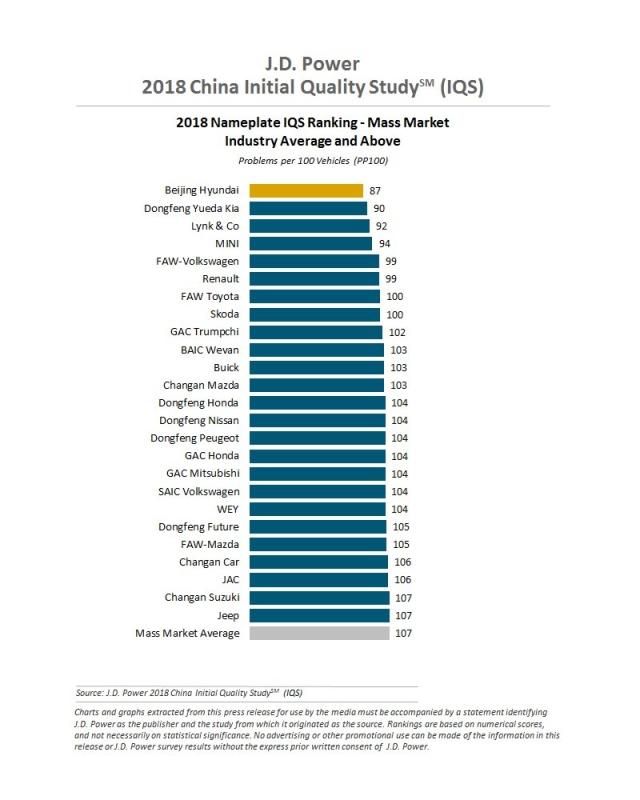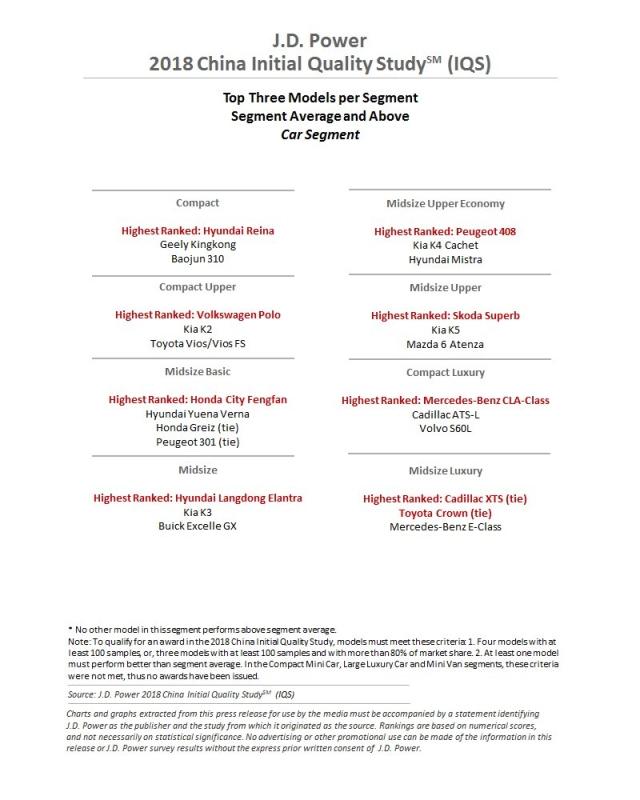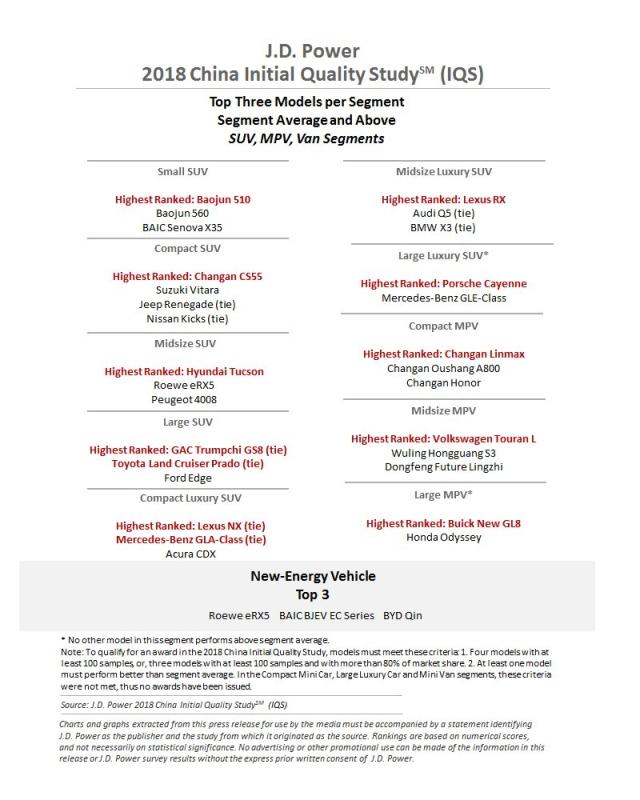New-Vehicle Quality in China Decreases; New-Car Smell Improves, J.D. Power Finds
New-Energy Vehicle Segment Award Introduced
BEIJING: 27 Sept. 2018 – New-vehicle quality in China has slightly decreased after years of continuous improvement, but the new-car smell, which has long been the top complaint by vehicle owners in China, has substantially improved, according to the J.D. Power 2018 China Initial Quality StudySM (IQS), released today.
The study, now in its 19th year, measures new-vehicle quality by examining problems experienced by new-vehicle owners within the first two to six months of ownership in eight problem categories. The overall initial quality score is determined by problems reported per 100 vehicles (PP100), with a lower number of problems indicating higher quality.
After years of significant progress in new-vehicle quality, the industry initial quality in 2018 is 2 PP100 higher than in 2017, with a score of 105 PP100. The decrease is a result of an increase in design problems such as navigation system inaccurate; windows fog up excessively/ don’t clear quickly; built-in Bluetooth mobile phone/ device has frequent pairing/ connectivity issues; audio system difficult to use; and built-in voice recognition frequently doesn't recognize.
“Along with the development of automotive manufacturing technology and process, the defect/ malfunction-related problems have continuously improved, while the design-related problems have been rising. It is predictable that with the increase in the installation of smart-connected in-vehicle devices, design problems will be more critical to the usability of the car,” said Jacob George, Vice President and General Manager, J.D. Power Asia Pacific. Over the past three years, the number of defect/ malfunction-related problems has dropped by 2 PP100, and the design-related problems have increased by 5 PP100.
However, there has been a notable improvement in historically Chinese-specific issues such as unpleasant interior smell (improvement of 4.8 PP100 from 2017), followed by excessive road noise (3.6 PP100); engine loses power when air conditioning is on (2.7 PP100); excessive wind noise (2 PP100); and excessive fuel consumption (1.9 PP100).
“It’s a good sign that the Voice of the Customer is increasingly making an impact and being heard. We are glad to see most automotive manufacturers in China have begun to recognize those Chinese-specific problems raised by consumers and have been trying to improve them,” said Jeff Cai, General Manager of Auto Product, J.D. Power China.
Following are additional findings of the study:
- New-energy vehicles have far more problems than fossil-fuel vehicles (141 PP100 vs. 105 PP100, respectively): The three biggest gaps between the two are air conditioning doesn't achieve/ maintain desired temperature; engine loses power when air conditioning is on; and seat materials scuffs/soil easily.
- Gap between Chinese domestic brands and international brands expands after narrowing over seven years: From 2011 to 2017, the gap had reduced from 101 to 13 PP100, but it has increased to 15 PP100 this year. The problem areas with the biggest gaps are heating/ ventilation/ air conditioning (HVAC); exterior; and engine/ transmission.
- More vehicle brands and models enter the market: The number of brands that are covered in the 2018 study is 13 more than last year, and the number of models has increased by 34, compared with 2017.
Highest-Ranked Brands and Models
Porsche ranks highest in initial quality among luxury brands for the fifth consecutive year, with a score of 69 PP100. Beijing Hyundai is the highest-ranked mass market brand, with a score of 87 PP100. GAC Trumpchi ranks highest in initial quality among Chinese domestic brands for the sixth consecutive year.
Beijing Hyundai has three models (Hyundai Reina, Hyundai Langdong Elantra and Hyundai Tucson) that receive model-level awards.
• Lexus models that rank highest in their segments are Lexus NX and Lexus RX.
• Mercedes-Benz models that rank highest in their segments are Mercedes-Benz CLA-Class and Mercedes-Benz GLA-Class.
• FAW-Toyota models that rank highest in their segments are Toyota Crown and Toyota Land Cruiser Prado.
• SAIC Volkswagen models that rank highest in their segments are Volkswagen Polo and Volkswagen Touran L.
• Changan Car models that rank highest in their segments are Changan CS55 and Changan Linmax.
• Roewe eRX5, BAIC BJEV EC Series and BYD Qin are the highest-ranked models in the inaugural new-energy vehicle (NEV) segment. J.D. Power is going to conduct and publish a dedicated new-energy vehicle quality study in China for the first time in 2019.
Other models that rank highest in their respective segments are Porsche Cayenne; Cadillac XTS; Skoda Superb; GAC Trumpchi GS8; Buick New GL8; Honda City Fengfan; Peugeot 408; and Baojun 510.
The 2018 China Initial Quality Study is based on responses from 33,404 vehicle owners who purchased their cars between June 2017 and May 2018. The study includes 285 passenger-vehicle models from 77 different brands. The study was fielded from December 2017 through July 2018 in 71 major cities across China.
J.D. Power is a global leader in consumer insights, advisory services and data and analytics. Those capabilities enable J.D. Power to help its clients drive customer satisfaction, growth and profitability. Established in 1968, J.D. Power is headquartered in Costa Mesa, California, and has offices in Shanghai, Beijing, Tokyo, Singapore, and Bangkok serving the Asia Pacific region. J.D. Power is a portfolio company of XIO Group, a global alternative investments firm headquartered in London, and is led by its four founders: Athene Li, Joseph Pacini, Murphy Qiao and Carsten Geyer. For more information, please visit china.jdpower.com or stay connected with us on J.D. Power WeChat and Weibo.
Media Relations Contacts
Geno Effler; J.D. Power; Costa Mesa, California, USA; 001-714-621-6224; media.relations@jdpa.com
Shana Zhuang; J.D. Power; China; +86 21 8026 5719; shana.zhuang@jdpa.com
About J.D. Power and Advertising/Promotional Rules: www.jdpower.com/business/about-us/press-release-info
# # #
NOTE: Four charts follow.



